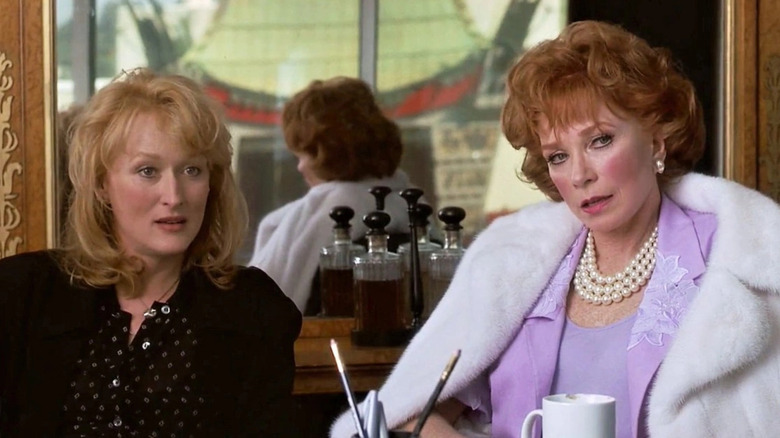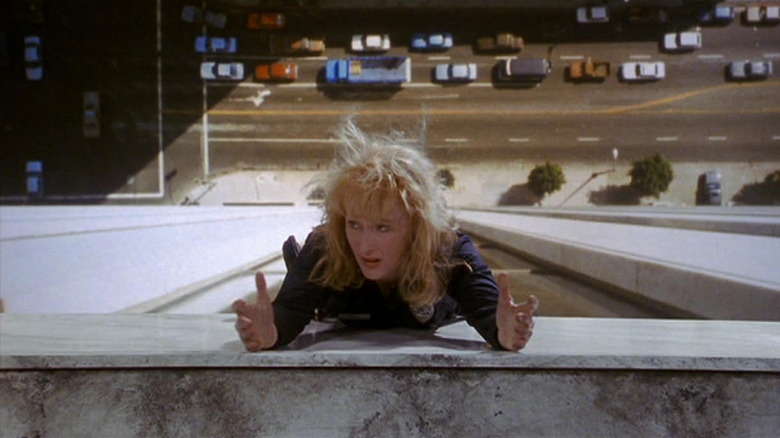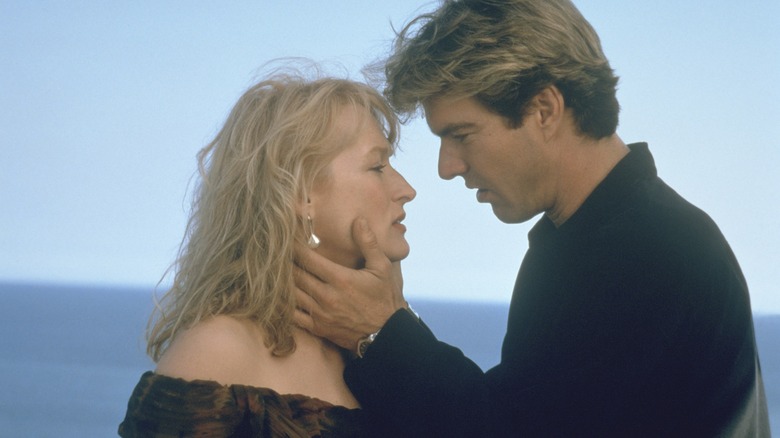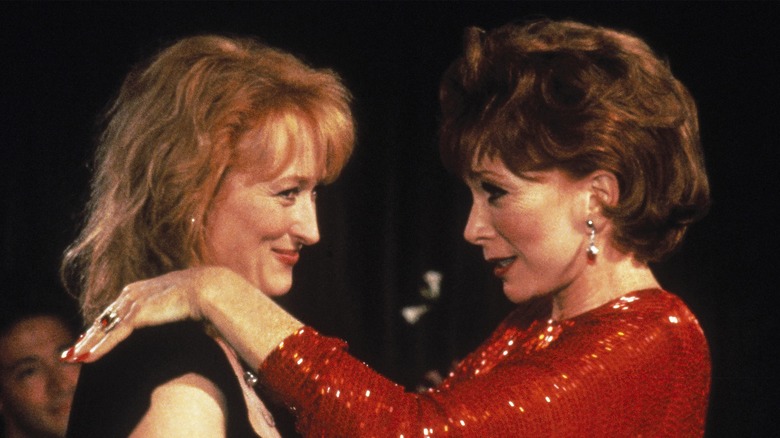The Daily Stream: Postcards From The Edge Is A Fabulously Funny Blend Of Fact And Fiction
The movie: "Postcards from the Edge"
Where you can stream it: HBO Max
The pitch: Based on the semi-autobiographical novel of the same name by Carrie Fisher, "Postcards from the Edge" follows actor Suzanne Vale (Meryl Streep) as she deals with substance abuse issues that land her in rehab. In order to keep her contract with a film studio, Vale must stay sober and live with her mother. The problem is that her mother is Doris Mann (Shirley MacLaine), a former Hollywood A-lister with a love for liquor. Much like Fisher's relationship with her own mother, Debbie Reynolds, Suzanne and Doris love one another but have almost zero understanding of or sympathy for each other. Suzanne just wants out from beneath her mother's shadow, while Doris doesn't understand why her daughter can't just behave and put on a good show.
As Suzanne struggles with sobriety and a runaway romance with a womanizing producer (Dennis Quaid), she begins to see herself, her mother, and her career in a new light. Trying to hold it all together is hard enough sometimes, but trying to hold it all together when your mother is a domineering former superstar is something else entirely.
Why it's essential viewing
It's shocking that "Postcards from the Edge" isn't a beloved cult classic among cinephiles, because this fiercely funny and whip-smart comedy from one of cinema's greatest script doctors is a star-studded bit of brilliance from director Mike Nichols. Nichols directed classics like "The Graduate," "The Birdcage," and "Who's Afraid of Virginia Woolf?" and he brings every ounce of his talent to "Postcards from the Edge," giving this tale of tortured mother and daughter just the right amount of Old Hollywood polish.
"Postcards from the Edge" is incredible on multiple levels, because it's not only a great comedy about Hollywood, family, and legacy — there's truth woven throughout this "fictional" film. Fisher wrote the screenplay based on her semi-autobiographical novel, and fans of her memoirs will recognize some of her and her mother's candid moments re-enacted through a slightly sillier lens. Reynolds was even in on the fun of it, and told Nichols that she wanted to play Doris but he said she wasn't "right for the part." As fun as it would be to see Reynolds vamp it up, MacLaine is absolutely killing it here and I can't imagine anyone else having a blow-up on a stairwell with Streep over once flashing her panties to a room of Suzanne's friends.
Nichols was also drawing from his own life with "Postcards," as he had just finished filming "Working Girl" with Melanie Griffith. Like Suzanne, Griffith struggled with a drug problem during filming that caused delays and fines and eventually landed Griffith in rehab — she also had a famous mother, "The Birds"' Tippi Hedren. Almost everyone involved with "Postcards from the Edge" had some knowledge of the industry or some personal relationship to the story, and it makes the whole thing feel deeply authentic.
Life can be funny sometimes
Though Fisher said in interviews she was only writing a "mother and daughter actress," it's impossible not to see some of Fisher in Suzanne. They don't only share experiences, but the same sarcastic way of handling every situation. Suzanne has a quippy response to everything, whether it's her mother questioning her hairstyle in rehab or an answer to Jack, the producer who dropped her at the hospital after she overdosed on a date. They have a whirlwind romance and even though Jack is kind of a sleazeball, he's also young Dennis Quaid, so the romance aspect is appropriately hot. "Postcards from the Edge" isn't a romantic comedy by any stretch of the imagination, but the romantic elements provide some laughs and plenty of eye candy.
The drama in "Postcards" is excellent, moored in the reality of its creators' Hollywood experiences, but the comedy balances it nicely. Some of it is situational, like Suzanne and Doris being interrupted during a rehab conversation by two gay men who want to gush over Doris, but most of it comes from the snappy back-and-forth between the cast and Fisher's deliciously dry dialogue. Every viewing of "Postcards from the Edge" will reward you with another great joke lost in an argument or whispered beneath someone's breath, making it the kind of movie you can watch again and again.
A star-studded cast of talented performers
"Postcards from the Edge" features Annette Benning in one of her earliest roles as an actress playing a sex worker who also sleeps with Jack and cannot pronounce the word "endorphin." It also features early career turns by Oliver Platt and Anthony Heald, both of whom would go on to have massive careers as character actors. Nichols also called in some favors from old friends, so a few huge stars appear in minor roles, like Gene Hackman as a producer who seems to actually care about Suzanne. Rob Reiner plays a movie producer who demands that Suzanne take an invasive drug test, while Richard Dreyfuss plays the doctor who pumped Suzanne's stomach and asks her out on a date. Heck, even Ted Raimi appears in an uncredited role as an emergency room attendant!
Even with all of these stars, Meryl Streep shines in a performance that deserves more acclaim. When she tells Hackman's character that he can't say anything to her worse than what she says to herself, it rips through the screen with a personal agony that's easy to relate to. She later tells him, "I don't want life to imitate art, I want life to be art," and that's the whole genius of "Postcards from the Edge." It's life as art, created by some of Hollywood's most talented artists.



